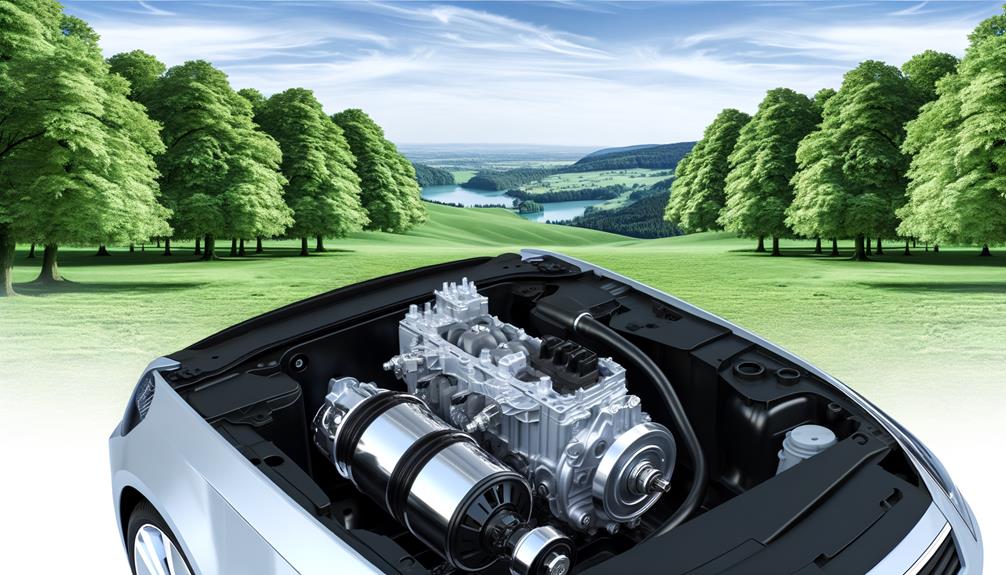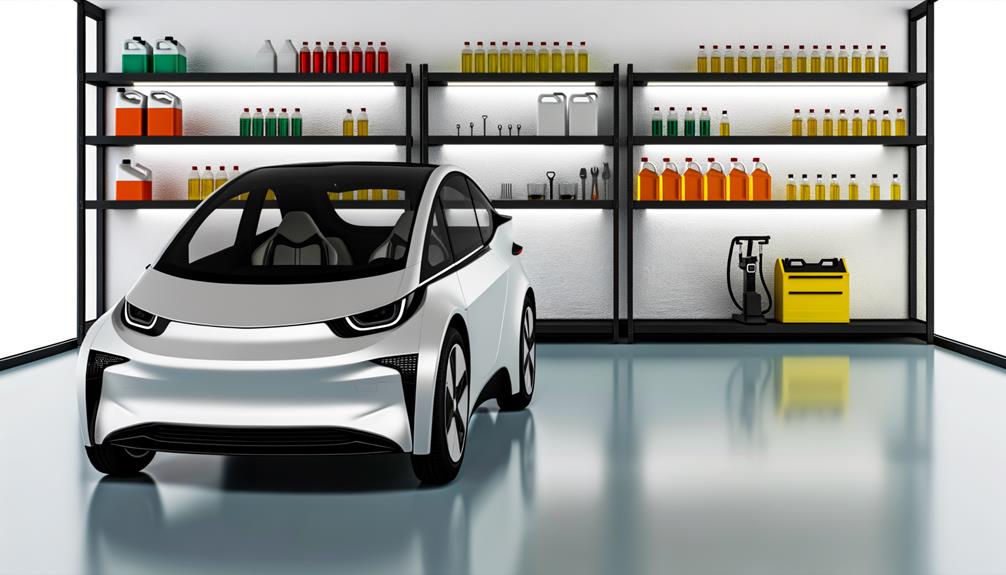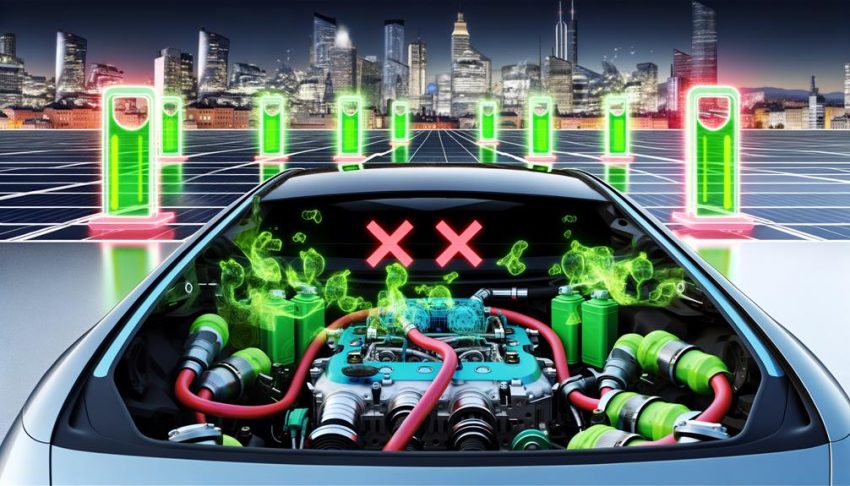You might wonder if electric cars use oil, especially when considering their maintenance needs compared to traditional vehicles. While it's true that EVs don't require traditional engine oil changes, they do need specific fluids for ideal performance. For instance, cooling oil is essential for battery and motor temperature regulation, and lubricants are necessary for gearbox components. So, what exactly does this mean for your maintenance routine and the longevity of your vehicle? Let's explore how these fluids play an important role in keeping your electric car running smoothly.
Contents
Oil and Fluid Requirements
When considering the oil and fluid requirements of electric vehicles (EVs), it's vital to understand that they don't need traditional engine oil changes. This is because EVs use electric motors rather than internal combustion engines (ICEs), which eliminates the need for conventional engine oil. Instead, EVs depend on cooling oil to regulate battery and motor temperatures, a key factor for ideal functionality and longevity.
Despite the absence of regular oil changes, maintaining your EV still involves periodic checks of important vehicle fluids. For instance, lubricants in the gear reducer, which helps manage the power from the electric motor to the wheels, need regular inspection. Manufacturers often recommend lubricant checks every 7,500 miles. Additionally, coolant plays a significant role in temperature management, guaranteeing that the battery and electric motor operate within safe limits. Neglecting coolant levels can result in overheating, which may damage vital components.
Brake fluid is another important element that requires attention. While EVs experience less brake wear due to regenerative braking systems, the brake fluid still needs regular monitoring to maintain braking efficiency and safety. Regular maintenance checks can help confirm that your EV operates smoothly and reliably over time.
Compared to traditional vehicles, EVs have far lower maintenance needs. They eliminate tasks like spark plug replacements and fuel filter changes, making them more convenient in the long run. However, it's vital to stay vigilant with key fluid checks to guarantee your electric vehicle remains in top condition.
In hybrid vehicles, which combine electric motors with ICEs, traditional oil changes are still required, unlike fully electric counterparts. This distinction underscores the varying maintenance requirements between different types of electric and hybrid vehicles.
Electric Motor Maintenance
Electric motor maintenance in electric vehicles (EVs) involves specific, but minimal, tasks compared to internal combustion engine (ICE) vehicles. You'll find that the absence of traditional oil changes considerably reduces the complexity and frequency of required maintenance. EVs don't demand the same lubrication as ICE vehicles, but attention to the gearbox and electric motor lubrication remains essential.
Maintenance tasks for the electric motor are infrequent, contributing to lower operational costs. Typically, an annual check-up is recommended to guarantee your EV's ideal performance. For high-mileage drivers, bi-annual check-ups are suggested to monitor the health of the electric motor and associated systems. These periodic checks are important for maintaining the efficiency and reliability of your EV.
Regular inspections focus on the motor and gearbox lubricants. Even though EV motors don't require engine oil, the gearbox and electric motor components do need lubrication. These inspections, while relatively straightforward, are critical. The maintenance schedule may vary by manufacturer, but the consensus is clear: regular checks of the motor and gearbox lubricants are necessary.
Lubrication Longevity

Benefiting from advanced engineering, the lubrication longevity of electric vehicles (EVs) is a vital factor in their reduced maintenance demands. Unlike conventional vehicles, EVs don't require traditional engine oil because their electric motors operate without the lubrication needs of internal combustion engines. This fundamental difference greatly impacts the maintenance schedules for EVs, focusing more on occasional fluid checks rather than frequent oil changes.
Electric motors in EVs have fewer moving components compared to conventional engines, which results in lower maintenance frequency. While EVs primarily lack the need for traditional engine oil, they aren't entirely devoid of lubrication requirements. For instance, components like the gearbox still require lubrication, often in the form of reduction gear oil. Manufacturers like Nissan recommend checking this oil annually in models such as the Leaf, underscoring the importance of inspecting specific lubricants to guarantee peak performance.
Maintenance schedules for EVs typically include fluid checks at intervals, such as every 7,500 miles. These checks are essential for monitoring the condition and levels of lubricants, making sure they perform effectively and preventing potential leaks. This routine contrasts sharply with the frequent oil changes needed for conventional vehicles due to contamination from metal-on-metal contact.
The stable lubrication system in EVs not only reduces the frequency of maintenance but also enhances the longevity of moving components. By eliminating the need for traditional engine oil and incorporating more durable lubricants for essential parts, EVs offer a streamlined and efficient approach to vehicle maintenance, making them an attractive option for those seeking reduced upkeep without compromising on performance.
Maintenance Tasks Not Required
One major advantage of electric vehicles (EVs) is the significant reduction in maintenance tasks compared to their internal combustion engine (ICE) counterparts. With EVs, many traditional vehicle maintenance tasks become obsolete, simplifying your car care routine and saving both time and money.
Unlike traditional vehicles, EVs do not require regular engine oil changes, as they don't use oil for lubrication in the same way. This means no more reminders for conventional oil changes. Additionally, you won't need to worry about spark plug replacements, fuel filter changes, or drive belt swapping. These are all maintenance tasks that are necessary for internal combustion engines but completely irrelevant for electric cars.
Consider these benefits:
- No spark plug replacements: EVs use electric motors, which eliminates the need for spark plugs altogether.
- No fuel filter changes: Since EVs don't run on gasoline, there's no need for fuel filters, reducing another routine maintenance task.
- No drive belt swapping: The simplified drivetrain design of an EV doesn't include traditional engine components that require drive belts.
Furthermore, EV maintenance tasks do not include issues related to water pumps and carburetors, common concerns for ICE vehicles. Traditional maintenance tasks such as radiator repairs and exhaust system checks are also not applicable to electric cars. This drastically reduces the overall maintenance burden, making EVs a more convenient and cost-effective option over the long term.
EV manufacturers continue to emphasize the reduced maintenance requirements as a key benefit of electric vehicles. The absence of conventional oil and fewer mechanical components result in less maintenance, ensuring that your time and resources are spent more efficiently.
Additional Resources

When steering through the landscape of electric vehicle maintenance, it's crucial to have reliable resources at your disposal. Unlike traditional vehicles, electric vehicles (EVs) don't require regular engine oil changes. However, understanding the unique maintenance needs of EVs will guarantee your vehicle remains in peak condition.
First, consult your EV's owner's manual. This document provides detailed maintenance schedules tailored to your specific model, highlighting important tasks such as lubricant checks for the gearbox and driveline. Even though EVs eliminate the need for engine oil, periodic inspections and replacements of other fluids are necessary. For instance, brake fluid should be checked and possibly replaced every 40,000 km (25,000 miles) to maintain braking efficiency.
Websites like Cars.com offer valuable insights into electric car maintenance. These platforms can help you understand the differences between EVs and traditional vehicles, emphasizing the significance of fluid management. They often provide step-by-step guides and video tutorials, making complex procedures more accessible.
When it comes to fluid management, don't overlook the crucial role of the gearbox and driveline. While these components differ from those in traditional vehicles, they still require attention to guarantee smooth operation. Regular lubricant checks can prevent potential issues and extend the lifespan of your EV.
Frequently Asked Questions
What Do Electric Cars Use Instead of Oil?
Instead of oil, electric cars rely on battery maintenance, coolant systems for thermal management, and specific lubricants for the electric drivetrain. Regular checks of regenerative braking fluids are essential, contributing to lower maintenance costs and improved energy efficiency.
What Fluids Do Electric Vehicles Use?
Electric vehicles use coolant systems for thermal management and battery maintenance, brake fluid for regenerative braking, and transmission fluid for electric motors. Regular checks and fluid recycling per maintenance schedules guarantee component longevity and peak performance.
Do Tesla Cars Still Use Oil?
You won't need traditional oil changes for Tesla cars. Tesla maintenance focuses on electric drivetrain efficiency, battery performance, and sustainable energy. This results in lower vehicle emissions, cost savings, and increased Tesla longevity, thanks to advanced Tesla technology and charging infrastructure.
Do Electric Cars Use Antifreeze?
Yes, electric cars use antifreeze in their cooling systems for battery maintenance and thermal management. Proper coolant types optimize performance and energy efficiency, extending electric vehicle lifespan. Regular checks reduce maintenance costs and minimize environmental impact.
Conclusion
In summary, while electric cars don't require traditional engine oil, they do use specific fluids for cooling and lubrication, ensuring peak performance. Regular checks on these fluids are essential for maintaining the longevity of your EV. You won't need oil changes, but don't overlook the importance of other maintenance tasks. Stay informed about your vehicle's specific needs to keep it running efficiently. For detailed guidance, consult your EV's manual or a certified technician.
